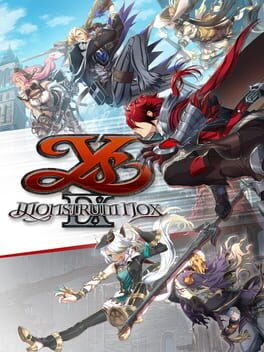This review contains spoilers
Ys IX wants to die. It is a wild game of tug-of-war between celebrating and despairing the conservative realities the series has found itself trapped in (ie legacy and tradition). Here, the player's efforts to supress a revolt against colonial oppressors is revealed to be a fairly explicit critique of itself and the games industry writ large; a stagnant place obsessed with iteration and product and "progress", where new games aren't games but IP--intellectual property--and gamers delight in sales and Metacritic scores.
Using its rigid, episodic structure and (in normal mode) combat that can be solved without a thought in the brain, the game acts much as the prison that the narrative centers around, lulling the player into a sort of dull comfort with the lack of freedom afforded. It can be maddening watching the wheels spin; by the end you hardly want to leave. The NPCs littering the city are so charming after all, the cast so nice, the battles like a warm bath.
So when the villain is revealed to be, on some level, the very history of Ys, which is responsible for the prison that contains you, a well of complex emotions is born. Adol fights Adol, but he can never win or lose because Ys cannot die as long as money is to be made. It is like the cast: a hommonculi to be born and reborn for eternity until its use runs dry.
And what the game asks at the end, and doesn't really have an answer for is as simple and complex as a question can get: is that such a bad thing? Part of it says no, that these memories are valuable, that they have connected people and helped others, that the comfort expected from the series provides what so many games strive for--a respite from the world. But another part the game is there, and it cries "yes."
Ys is getting another game soon. It couldn't not. 10 is looking a lot like 8 and 9 while also bringing in trends from other games. It looks good. I'm looking forward to it.
more thoughts here
Using its rigid, episodic structure and (in normal mode) combat that can be solved without a thought in the brain, the game acts much as the prison that the narrative centers around, lulling the player into a sort of dull comfort with the lack of freedom afforded. It can be maddening watching the wheels spin; by the end you hardly want to leave. The NPCs littering the city are so charming after all, the cast so nice, the battles like a warm bath.
So when the villain is revealed to be, on some level, the very history of Ys, which is responsible for the prison that contains you, a well of complex emotions is born. Adol fights Adol, but he can never win or lose because Ys cannot die as long as money is to be made. It is like the cast: a hommonculi to be born and reborn for eternity until its use runs dry.
And what the game asks at the end, and doesn't really have an answer for is as simple and complex as a question can get: is that such a bad thing? Part of it says no, that these memories are valuable, that they have connected people and helped others, that the comfort expected from the series provides what so many games strive for--a respite from the world. But another part the game is there, and it cries "yes."
Ys is getting another game soon. It couldn't not. 10 is looking a lot like 8 and 9 while also bringing in trends from other games. It looks good. I'm looking forward to it.
more thoughts here
